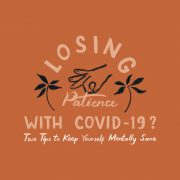Will I Miss Out If I Wait on God?
Written by Jessie Ng, Malaysia. Originally written in Simplified Chinese.
I’ve always hated making decisions since I was young. I would often feel conflicted about what I should choose, not knowing which choice was better. And even when I knew what the “better” choice was, I’d still be unsure if I should commit to it.
Oddly, dealing with the former is sometimes easier. Whenever I don’t know which option is better, I know I can seek answers from the Bible and consult trusted elders and friends in church. But when it comes to the latter—committing to make the “better” choice, it becomes a matter of will: would I be willing to make the “better” choice?
That’s when I start splitting hairs. How do I define what is “good” and “better”? How can I be sure that what others think is “better” is truly good for me? In fact, sometimes I would get a strong urge to go against other people’s advice, because my “heart” seems to be telling me differently, and, well, I’ve got to follow my heart. . .
It’s hard to wait when in love
This tendency to resist the advice of others has helped me understand my friend Q’s decision. Some time ago, Q shared with me that she was attracted to a guy in our fellowship. Which was not surprising, since they attend the same church and serve together as leaders in the campus ministry, plus they also live close to each other.
Q is a gentle and lovely girl, and is very eager to serve despite her young age. Y is also an outstanding guy, and is likewise passionate about serving and caring for others. And the truth was, most friends already saw Q and Y as a couple of sorts.
As the two gradually realised their feelings for each other, Q began to struggle with the way they interacted with each other, as they were clearly more intimate than platonic friends. As they’re both quite young, it was hard for them to manage their growing affection and set boundaries with each other.
Eventually, Q knew that she had to decide. She could heed the advice of the elders and other brothers and sisters and wait for a while. Or, she could listen to her heart and start a romantic relationship with Y.
After we spoke for more than two hours, she decided she would remain friends with Y, believing that it was the right decision according to her conscience.
However, one week later, Q and Y privately decided to be in a romantic relationship, which took everyone by surprise. When I thought about it though, it wasn’t really that surprising. I remember nearing the end of my conversation with Q, she had asked me yet again, “Why does everyone think it’s better not to start a romantic relationship?” I knew that Q was doubting her decision then to remain friends with Y.
Reflecting on the turn of events has reminded me of an analogy I once heard about romantic relationships: getting into a relationship is like going on a trip into the wilderness. While the scenery is beautiful and the unknown thrilling, the journey ahead is tough, with all kinds of dangers, not to mention the weariness and exhaustion to be expected from the long road. If a young person wants to embark on that kind of journey spontaneously, those around them will surely persuade them to wait till they’re more prepared.
In a relationship, both parties should be emotionally mature and able to provide for themselves. They must know the purpose of their relationship, and how to protect themselves and each other.
If, after some years of preparation and experience, they still wish to start a romantic relationship, by then they would hopefully be more mature and stable and would’ve thought things through. That should hopefully save them some frustration and pain and allow them to venture further in their relationship.
Will God let us miss out on His good?
There’s often that fear of missing out on the opportunities in front of us if we don’t take action. And so waiting on God becomes a most challenging assignment. But God knows what we need. He gave up even His own life for us. How would He not know our deepest needs?
We all know the story of how God rejected Saul and anointed David as the king of Israel. Even though David knew that Saul was after his life, he refused to kill Saul when he had the opportunity. “As surely as the Lord lives,” he said, “the Lord himself will strike him, or his time will come and he will die, or he will go into battle and perish. But the Lord forbid that I should lay a hand on the Lord’s anointed” (1 Samuel 26:10-11).
David couldn’t foresee how things would turn out, and neither can we. But we can always choose to wait on God or do what we think is best. David spared Saul’s life twice not because he was weak or timid. Instead, he feared God, so he chose to obey and wait on Him.
While God is sovereign over all things, He gave us free will because He loves us. More importantly, God wishes for us to experience love and receive true joy from our decisions to honour Him.
And so, there are three perspectives and responses for us to consider when it comes to obeying God:
- “Obeying God is difficult, my heart is too weak and unwilling. I’ll just follow my heart. Anyway, God will gradually change me over time.”
- “Obeying God is difficult, and honestly I don’t really want to. But I feel obligated as a Christian and a child of God. So I might as well choose to obey Him, so my conscience doesn’t have to suffer.”
- “Obeying God is difficult. But the Bible and my past experiences have taught me that obeying Him brings blessings and joy, and rejecting Him causes suffering. Even as I struggle, I believe in His faithfulness and mercy, and so I’ll choose to obey. I believe that the Holy Spirit will affirm that I have made the right decision and give me peace and joy.”
These responses can also represent three stages in our spiritual growth. Sometimes, we may advance through the stages in order. At other times, we may retreat to the previous stage. But for believers who have reached the third stage, they will have experienced God’s faithfulness and mercy and understand how obedience is a joy in itself.
As 2 Timothy 2:21 says, “Those who cleanse themselves from the latter will be instruments for special purposes, made holy, useful to the Master and prepared to do any good work.” As we obey and love God more, we will grow in His likeness and reflect His glory. When that time comes, we will be experience the truest joy that comes from Him.












1 Samuel 26:10-11 should be the reference used regarding David’s decision not to kill King Saul, when he had the opportunity to do so.
Hi Mia, thanks for spotting the error! We have corrected the verse reference.